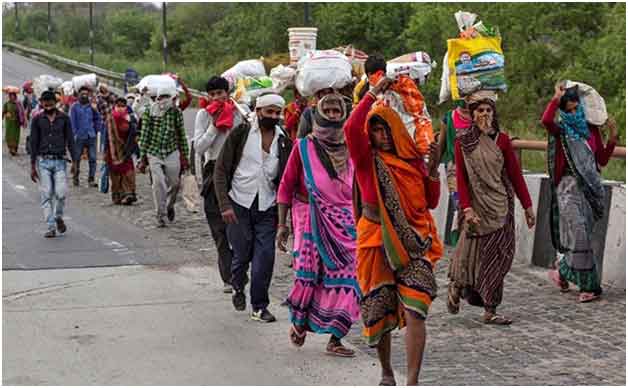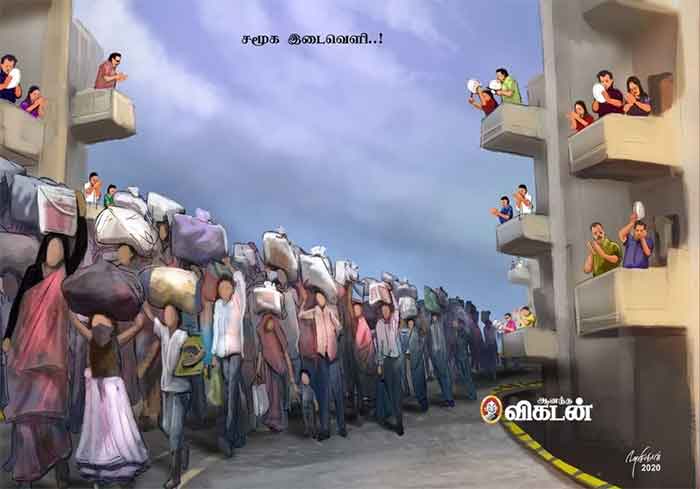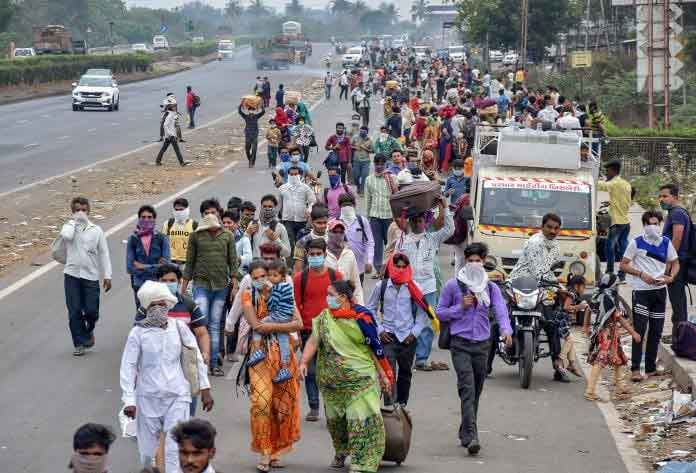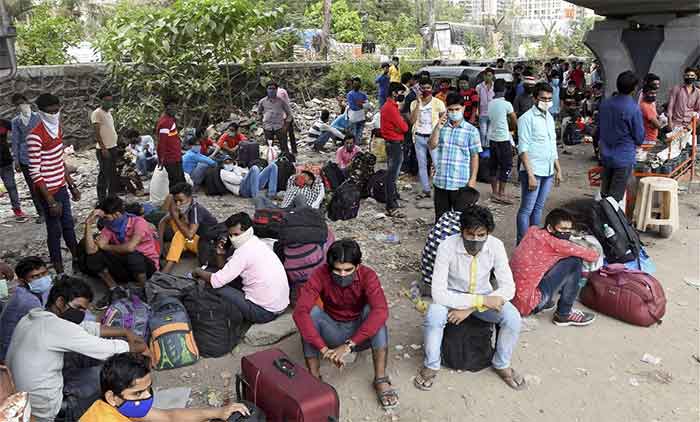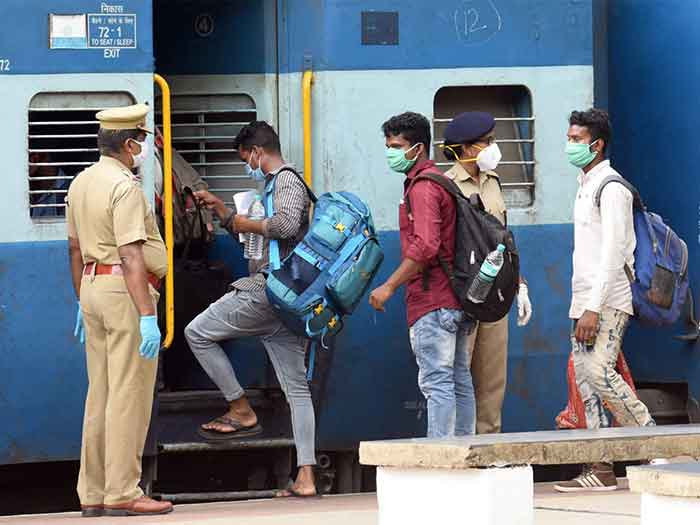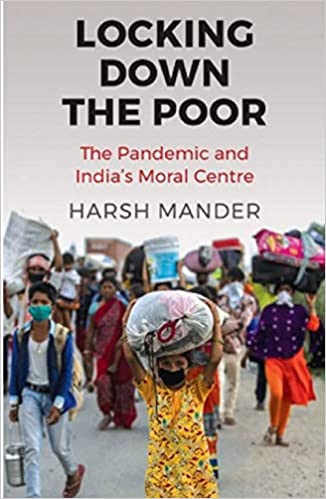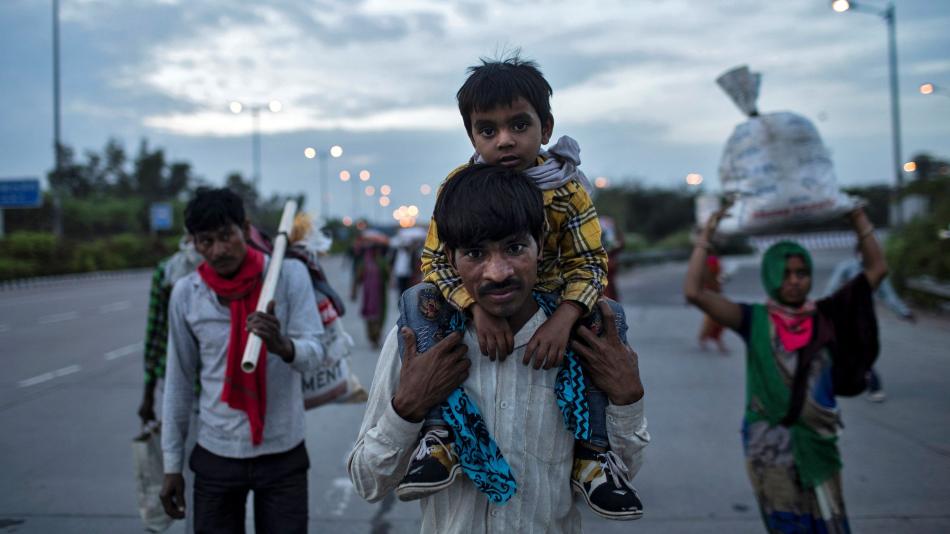
Corona pandemic finds no end. And the unending miseries of migrant labourers marching towards their native villages still continues Fainting and frowning with anger and anxiety – migrant workers caged in lockdown imbroglio bore the brunt of challenging hardships.
The survival of migrant workers in makeshift settlements in cities and towns remains at stake due to shortage of resources, the avalanche of adversities forced the poor souls to migrate to their homes. Caught between the devil and the deep sea, returning to the native villages became the only viable hope for workers to fight the dual dangers of hunger and disease. The pandemic has penalized the poor workers to dare the barefooted walk of hundreds of kilometers. While the lockdown was imposed to contain the spread of the virus, prolonged deprivation from work has imposed a dreadful and deteriorating spell of starvation for thousands of workers forcing them to defy all restrictions in their march towards their native places.
Haunted by hunger, the fallacy of workplace being a home away from home stands brutally exposed. The firsthand experience of lockdown stings by workers uncovered the bitter truth of urban settlements being hostile and highly indifferent, insulting and intimidating. Left high and dry, alienated in aversive and unfriendly circumstances – lockdown has been a deadly nightmare that pushed these migrant workers into the dungeons of utter misery and impoverishment. Factories, that they served and sustained with sweat and blood failed to offer them the much needed support as they battled for survival with tremendous hardships and dangers. Let down by everyone, with hopes dashing to the ground, migrant workers march to home seems not only a necessity but also an inevitable compulsion.
Braving all odds and negotiating all impossibilities, the road to home although hundreds of kilometers away still allured labourers to find refuge from the dual backlashes of pandemic and poverty. Young mothers walking tirelessly barefoot with headload of baggage carrying their hungry infants presented nerve wrenching scenes reflecting the deep rot of a failed socio-economic system. The hardships dismantled their delusions and dumped their hopes and expectations like trash in the dustbin.
The sea of bare-footed desperate, helpless workers marching on deserted roads and railway tracks included frail bodied men and women, children, pregnant women and even physically challenged walking days and nights to inch closer to their home. Bye-passing the security checkpoints and road barricades, labourers forcibly opted all the alternative ways and means to reach to their homes at the cost of risking their lives. This enforced marathon yielded painful and heart wrenching accounts of traumatic journeys wherein some of the workers anonymously succumbed to death on the unknown roads. Exhausted and hungry while sleeping on railway tracks, some were mowed to death by fast moving trains. The coercive and callous migration draped with death unmasked cruel realities that surfaced openly and deservingly demanded serious considerations.
Who failed the helpless migrant workers? Delving deep inside the crisis of labourers reveals stark realities embedded in the systemic failure. Has the welfare of migrant workers ever been a political priority outlined in party manifestos? Has the economic system ever thought of providing security cushion to support and sustain labourers to meet exigencies like the contemporary corona pandemic? Has the so called civil society been compassionate to assert and considerate enough in highlighting and advocating the problems faced by labourers and last but not the least how much space and coverage mass media outlets have given to the unheard voices of labourers and did they ever question the authorities enjoying the echelons of power and decision making to rescue migrant workers trapped in chronic crisis..
The Stay Home, Stay Safe preventive slogan displayed everywhere proved a hollow banner for poor labourers who were away from home and were being hounded like cattle on deserted roads and in open spaces. Migrant workers along with their families without bread and butter have undergone a horrible experience with the option of staying indoors being more lethal than contracting corona virus outside.
The labourers are not solely to be targeted and demonized for being outrageously adamant to migrate. Lack of intent and initiative for their well-being and welfare, no social security backup, no health insurance, faulty exigency mitigation, dearth of proper and timely dispensation of resources to tackle the vital needs etc all have conspired together in pushing labourers into a deadly trap.
The kicking and whipping blame game of labourers tragedy by central and state governments adds insult to the injury and gives a cover up to their failure to rescue workers out of the colossal crisis. The politicization of pandemic and labourer predicament leads to distractions and vague fault finding exercise instead of fact finding and addressing this massive human tragedy.
The threat of corona pandemic is still looming large and mass exodus of labourers flocking in thousands can further worsen the spread of the disease far and wide posing risk to both the workers in particular and that of public in general. Both centre and the state governments have to rise above the blame game confrontation and mutually take a bold stand to mitigate the agonies of labourers who are under the hammer for such a long spell of time.
The lost faith in factory-based work culture in urban spaces infused ugly and unpleasant memories among migrant workers and is definitely a great setback. It will not be easy to restore back the lost trust instantly.
Addressing the intrinsic ailment rooted in defunct and discriminatory socio-economic system needs an urgent overhauling to incorporate and safeguard interests and wellbeing of majority of workers. From a post-pandemic perspective, problem of migrant workers’ demands an integrated and inclusive set of initiatives. Provision of relief and rehabilitation measures aimed at securing their wellbeing is a challenge. A fair blend of socio-economic and politico-legal worker friendly provisions will rekindle the lost hopes of migrant workers.
Labourers are human beings and their voices need to be heard with compassion. Their lives also matter equally when saving the precious lives of people is a priority in the corona pandemic.
Bilal Kaloo, Assistant Professor, Department of Education, University of Kashmir
Email: [email protected]
SIGN UP FOR COUNTERCURRENTS DAILY NEWSLETTER

